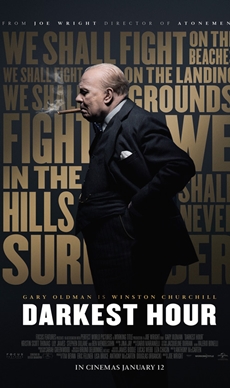|
|

|
|






















EDITOR'S PICK
'The Darkest Hour': Oldman was waiting all his life to play
Churchill's role (Review By Subhash K. Jha ; Rating:
**1/2)
The true measure of a masterly performance is in its proclivity to hide the
craft that goes behind the process of creating a character. In playing the
blustering, bullying, opinionated, pigheaded, unorthodox, raunchy but finally
effective British Prime Minister Winston Churchill, who took on the might of
Hitler, Oldman pulls out all the stops. He isn't afraid to let his impressive
skills shine through the astonishing prosthetics. It is a performance designed
to win awards.
And therein lies the main problem with this not-unimpressive biopic.
Oldman's portrayal of the blustering old man is spot-on, but designed to win the
Oscar. The rest of the components in this Joe Wright directed film pale into
insignificance. The film wears a strangely glum and dingy look, as though the
parliament sessions and the Prime Minister's home at the time of Hitler's
invasion were infected by a deep melancholy and a dismaying absence of sunshine.
The last time I saw a film looking so glum was in Shekhar Kapur's "Elizabeth".
"The Darkest Hour" revels in shadowy whispers and silhouetted innuendos. The
parliamentary sessions shown in the film never rise above the level of staged
drama and the famous Churchill speeches delivered through swigs of the trademark
cigar, do not transcend the mood of doctored dogma. Interestingly,
cinematographer Bruno Delbonnel had earlier collaborated with director Tim
Burton on "Dark Shadows".
Nonetheless, the lengthy film has passages of excellence popping up like a clown
at a very dull birthday party. One noteworthy portion of the film has Churchill
jumping out of his car at a traffic signal and taking a ride on the subway train
with British working class passengers.
"What's the matter? You've never seen a Prime Minister ride the subway before?"
he asks the open-mouthed commuters cheekily.
As played by Oldman, Churchill is a bit of a defiant brat. His limited
understanding of British politics is perpetually overridden by his determination
to do what is right for the country.
While the sequences where he brokers peacetime preconditions with his cabinet
members are done with a self-important clumsiness, Churchill's personal
relationships with the King (Ben Mendelsohn), with his wife (Kristin Scott
Thomas) and especially with his personal secretary (Lily James) come across with
rigorous sinewiness.
In a moment of unguarded emotional honesty, the secretary tells Churchill that
the war has taken away her brother. When she catches the Prime Minister staring
at her, he tells her with disarming disingenuousness, "I just want to look at
you."
Wish we could feel the same wave of empathy for the narrative which runs the
gamut of manufactured emotions from political rhetoric to wartime sarcasm.
"The Darkest Hour" never quite expels the feeling of being a vehicle for
Oldman's virtuosity. Yes, he was born to play Churchill. But was Churchill born
so that an actor as skilled as Oldman could one day play him?
Gary Oldman, for essaying former British Prime Minister Winston Churchill in "Darkest Hour", and Frances McDormand for her role as a grieving mother in "Three Billboards outside Ebbing, Missouri", won the best actor and best actress in a leading role categories at the 90th Academy Awards here.Read More
DARKEST HOUR, a Focus Features presentation of a Working Title Films Production.
A thrilling and inspiring true story begins on the eve of World War II as, within days of becoming Prime Minister of Great Britain, Winston Churchill (Academy Award nominee Gary Oldman) must face one of his most turbulent and defining trials: exploring a negotiated peace treaty with Nazi Germany, or standing firm to fight for the ideals, liberty and freedom of a nation. As the unstoppable Nazi forces roll across Western Europe and the threat of invasion is imminent, and with an unprepared public, a skeptical King, and his own party plotting against him, Churchill must withstand his darkest hour, rally a nation, and attempt to change the course of world history.